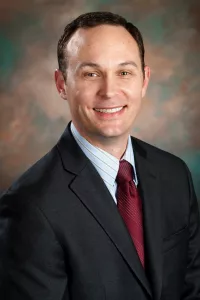
A financial windfall is the stuff of dreams for many people, with unexpected wealth that can mean lifetime security, the chance to achieve an aspirational goal or make what’s so far been a flight of fancy come true. Handling a large amount of money, though, takes special knowledge and expertise to make the most of it. And careful planning and attention to detail are essential. Otherwise, what might begin as a dream-come-true can quickly turn into a nightmare.
For novices, how to begin dealing with such good fortune can be a puzzle. The temptation might be to start spending, but financial professionals advise against it.
“The first thing they should do is nothing,” says Tom Hubert, senior vice president of wealth, insurance and auto services at Redwood Credit Union. He points out that from the

moment one finds out about a windfall to receiving the funds usually takes time, and the waiting period gives the recipient the opportunity to talk to experts and start creating a plan, rather than making quick—perhaps rash—decisions. An individual coming into sudden wealth needs to learn what is involved, so advisors should include a financial planner, an attorney and a tax consultant.
“First and foremost, we offer advice. … Before taking receipt of the funds, they should talk to these folks,” Hubert says.
He recommends taking the time to let an advisor get to know you and learn what’s important to you, as well as what’s not. “Sit down with someone you’re comfortable with,” he says. Each situation is unique and has its own nuances, such as the size of the windfall, personal needs and tax considerations, and it’s essential to get all of them in line and learn how to navigate them. ““The key is creating a plan that’s specific to you. … Your financial planner should be your financial partner,” he says, so one should expect regular communication with considerations for the future and education about things you don’t know.
A windfall might be an inheritance, a gift, the sale of a business, severance pay, stock options or—in very rare cases—a big lottery win. Regardless of the source of the newfound wealth, “We always start with a financial plan,” says Colten Christianson, a certified financial planner and partner in the wealth management group at Moss Adams LLP. As an accounting firm, Moss Adams assembles a team that includes a wealth advisor, an accountant, an estate planner and an attorney, to advise a new client. Christianson explains that all the services are intertwined, and “You get a holistic team that’s thinking about you in a coordinated way.”
He recommends setting up a bank account to hold the funds until a plan is complete. “Having a safe landing account for the dollars is critical,” he says. It’s the first step he recommends for someone selling a business, because it gives a client time to work with the team to develop strategies for an appropriate plan, especially if the windfall is above the limit of what the Federal Deposit Insurance Corporation covers.
“With any windfall, I would tell anybody to just hit the pause button,” says Matthew Delaney, wealth advisor and managing partner at JDH Wealth Management. “So many people make the biggest mistake within the first week of having that money,” he says. They might spend it on homes, cars or deposits on vacations, and if they haven’t considered the tax implications, they might overspend and run out of funds to pay the taxes required.

The flip side of spending too much is not doing anything at all. “A sudden windfall can make you feel like things are coming at you pretty fast,” says Christianson, so it’s easy to feel overwhelmed. He finds that if someone is worried about making the wrong decision, the concern can drive inaction, and they’ll sit tight and do nothing instead of moving forward. He’s seen people who have sold successful businesses and know its inner workings and the industry sector well, but when it comes to monetizing the proceeds from a sale, they’re facing an entirely new situation that causes them anxiety and stress. “Our job is to simplify this process for folks and help them to manage and organize it,” he says, starting with a plan that accelerates the most critical needs.
Financial planning 101
Christianson recommends finding a financial planner who’s certified, because he or she will have studied financial planning and have experience and a fiduciary obligation. Talking about money can be difficult, and a professional has the experience and skills to make it easier. In addition, a planner should be responsive, trustworthy and there for clients when they need them. “You’re entrusting a lot to these folks,” he says, so you need to have confidence in whomever you select. He also advises making sure a financial planner is the right fit for a particular situation. “We’re not the best fit for everyone,” he says, and Moss Adams will tell a potential client if the firm isn’t the best choice.
Once a person has chosen a financial planner, whether the money is in transition or the recipient has already received it, “The service is helping them get their arms around it,” says Delaney, because a windfall is often lifechanging. The first phase is a discussion about spending. He finds that most people know their income, but when he asks them how much they spend, they don’t answer. “They’re embarrassed by not knowing where their money goes,” he says, and so they must figure out what their current spending is. The second phase is determining the amount of the windfall and whether it’s extraordinarily large for an individual, or if he or she is already making substantial money, and the new wealth is extra. Recipients need to make sure the money will last, and so he runs different scenarios and helps people decide how much they’ll need to last a lifetime. Sometimes he sees people who are going through their money faster than they expected, because they’re spending too much. However, “When you get buy-in from someone who sees how much money they can spend, and they see the risk of running out of money, they’re more likely to change their habits,” he says.
He observes that hope springs eternal and, as well as underestimating the amount they’re spending, people often become overconfident. “It’s important to have someone who will hold your feet to the fire in challenging times,” he says, whether they’re economic conditions, gambling, investment or swings in the market. A financial planner will come up with an investment policy statement that shows one’s level of risk and the stock they’re going to buy. Without such a plan, someone could make an unwise investment following a stock tip from an acquaintance, or they might use a broker to buy and sell stock without a plan. A planner can be more objective while taking a client’s individual circumstances into consideration.
The specter of taxes
Taxes inevitably come with windfalls. Terry Dickens is a partner at Moss Adams whose expertise includes income-tax compliance and year-round tax, trust and estate planning. He observes that for someone who hasn’t had tax and financial-planning advice, a windfall can be both a blessing and a curse. “You need to know how much tax you’ll have to pay,” he says, reporting that federal tax can go up to 40%, and California tax can go up to 13.3%, depending on the tax bracket. The windfall recipient cannot depend on income-tax withholding and will have to pay estimated federal taxes regularly throughout the year, and a tax advisor can help figure out the amount of the payments and when to pay them. “If it’s before the transaction takes place, you can plan ahead and be prepared,” he adds.
He also points out that if a person decides to leave money to children, grandchildren or a charity, the recipient will have to pay income tax and estate tax. However, a large estate-tax exception is in place until 2025, and so someone who wants to pass down wealth has a rare opportunity to give money away now to avoid those taxes. He suggests working with a CPA, tax advisor and attorney to make sure it works for a given situation. He adds that if a windfall results from the sale of a business, Qualified Small Business Stock can be $10 million tax-free for federal tax purposes, but only certain small businesses are eligible for the tax break.
Charitable giving is another tax-saving strategy. “In the year of a windfall, it does make sense. It’s based on your income for that year,” he says. He adds that cash is usually the least efficient way to give, and long-term publicly-traded stock is better. An advisor will know the requirements and make sure you get the deduction, and if it’s structured correctly, you can give stock and not pay capital gains tax.
Dickens also recommends tax-loss harvesting. If you have some super-valuable stock you want to sell, you can work with your advisor to look through your stock portfolio to identify low-value stocks that you can sell at a loss to offset the gain.
Risk Assessment
Once you’ve received the money and deposited it in a secure place, it’s time to put it to work. The goal is usually to provide lifelong income, and Hubert reports that many different routes can ensure that the money will last for a lifetime. “It’s not always uniform by age,” he says, pointing out that younger people have more time in terms of lifespan and should plan accordingly. Individuals also must decide how much risk they’re comfortable with when it comes to investing, and depending on all the factors, some people will need to be aggressive, while a more conservative approach is better for others.
Before spending or investing any money, Delaney suggests paying off debts. “It can be free and liberating to be debt-free,” he says, although some exceptions do exist. For instance, if the interest is low, it might be better to wait to pay off a student loan. He also looks at whether a client wants to give some of the money away, perhaps to children, grandchildren or a church. “We’ve factored these things into the scenario to make sure they can do that,” he says. Next comes estate planning. He encourages meeting with an attorney to create a trust and will. “The goal is to provide for the next generation,” he says, so it’s important to protect your assets.
He also has a series of questions. Do they need life insurance? Is long-term care a concern? What do they want retirement to look like? “Life isn’t linear,” he says, and all kinds of unanticipated things are possible, so he asks clients to think through everything up front. “As soon as a plan is put together it will be wrong,” he says, so good planning requires being able to think through all the different pieces of life to aid in making adjustments as time goes on.
When you’re investing, “Make sure you’re taking on the right amount of risk,” he advises, pointing out that if a client has a $22 million trust that provides income, he probably shouldn’t take a lot of risk, while a 62-year-old who has planned poorly for retirement might need to take more.
The unexpected rattles the market, so relying on a trusted advisor who is objective can be invaluable. He recalls that three years ago, inflation and unemployment were issues, and people were scared, but he told them they were going to buy lower, because things were on sale. “We were rebalancing. People panicked in 2020, because things were ugly, but 2020 ended up being a great year for the market,” he says. “You cannot avoid the ups and downs,” he adds, but an advisor has his clients’ best interests at heart and will use his best judgement to ride them out.
“Having people spend their money is my favorite part of the job,” says Christianson. However, he cautions, the challenge is doing it in a strategic way. He starts by asking questions and finding out why a person wants to make investments. “Are you just earning for earning’s sake?” he asks. The answers allow him to create a plan that supports those things. A young person might want to buy a house, for instance, while someone older might want to incorporate the windfall into an existing plan or decide to spend some money on philanthropic endeavors that will benefit others. Once a plan is put into action, it’s important to continually revisit it to make sure it’s successful and still serving its purpose. He points out that life is always changing, and the plan has to reflect that, with adjustments along the way. “We use a Monte Carlo analysis to make sure there’s a high probability of success,” he says, referring to a method that uses a computer algorithm to statistically analyze random samples and their probable outcomes. “We want them [clients] to accomplish their goals and objectives.”
Avoiding the pitfalls
Windfalls come with challenges that can have negative consequences if they aren’t handled correctly. “It’s easy to overlook the details because there are so many of them,” says Hubert, and the lack of professional advice increases the possibility of a financial mistake. “I can’t stress financial planning enough,” he says, explaining that it’s important to plan budget and financial goals, because all those things can sneak up on you. A planner, however, will give you good choices so you can decide which one works best and increase your chances of success.
Some people want to handle their own money and investments, and “doing it in a modest way is totally fine,” says Christianson. He adds, however, that finding resources and doing research and due diligence is time-consuming and they could make emotional or irrational decisions that don’t work out well. Instead, he suggests allocating a small portion of funds that they don’t have to rely on long-term to fulfill that desire and outsourcing the rest to a qualified advisor.
Overlooking taxes is also a common mistake. If the windfall is severance pay, it’s taxed as ordinary income, but if it’s from the sale of business, taxes are calculated differently. “There’s nothing worse than selling a business and getting $10 million, and you think the tax will be $1 million, but it turns out to be $4 million,” says Delaney. He asks clients for tax returns, because it allows him to determine the thresholds and brackets. In addition, he says, “A CPA should be brought in if they don’t have one already.”
Dickens points out that California has one of the highest tax rates in the country, and so some people decide to move to another state where they won’t have to pay as much. However, they must plan well in advance and make sure the timing is right. “You can’t just move to Nevada and expect not to pay California tax,” he says.
All things considered, with wise planning, a windfall has the potential to make life better. “Be cautious in the early years, and you will have a better balance down the road,” says Delaney. He finds seeing a plan through to fruition rewarding and says, “It’s amazing when you get to work with someone, and you see that.”
I the meantime, he advises: “Dream a little bit, because when you have the dream, it is so much easier to attain it.”




2 thoughts on “There but for fortune: A sudden windfall can be the surprise of a lifetime—here’s how not to blow it all in Vegas…”
I do trust all the ideas you’ve presented in your post. They are really convincing and will definitely work. Nonetheless, the posts are too short for newbies. May just you please lengthen them a bit from next time? Thank you for the post.
I loved as much as you will receive carried out right here. The sketch is tasteful, your authored subject matter stylish. Nonetheless, you command get an edginess that you’ll be delivering the following. I’ll unquestionably come further formerly again as it’s exactly the same nearly very often inside case you shield this hike.